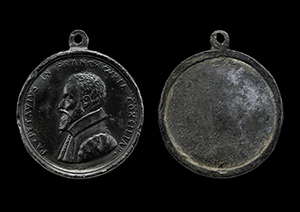Paul Petau – digital

In a study never addressed before, the project focuses on the figure of the jurist Paul Petau (1568–1614), a counselor of the Parlement of Paris, collector of books, antiquities and medieval coins. His private library—one of the most important of the time—was partially sold to queen Christina of Sweden. The catalog of his museum, printed in 1610, represents a turning point in the history of antiquarian culture. The book is made of two parts, the Antiquariae Supellectilis Portiuncula (prints of small objects) and the Veterum Nummorum Gnōrisma (prints of Roman and early medieval coins): there is no commentary, just captions and short notes on the illustrations. This work represents the first printed illustrated catalog of a private collection of antiquities. Moreover, Petau was one of the first known collectors of French Medieval coins.
The website, which is still in construction, makes available the sections related to the project’s objectives and deliverables.
In the page The Illustrated Catalogs – digital edition the two volumes on antiquities and medieval coins will be published in a facsimile edition with annotations. In addition, it will be possible to surf within its pages by clicking on the graphics and have access to the identified artifacts they represent. The database provides the possibility of browsing through the two volumes and accessing a record on each graphic and artifact represented. Vice versa, clicking on The collection, it will be possible to see the antiquities in Petau’s collection and then access the corresponding images in the book.
The page Library includes a virtual reconstruction of Paul Petau’s copious collection of manuscripts. Thanks to some existing inventories and the notes left by Petau himself on the manuscripts (shelfmarks, signatures, annotations) it is possible to recognize his volumes now preserved among important institutions all over Europe (see Manuscripts).
The project also aims to produce a hitherto nonexistent biography of Paul Petau and provide the complete list of his works. Additional material–letters, miscellaneous documents, drawings, and links to other sites about Petau– will be placed on the web. All this material will be accessible from the page Paul Petau and its sections.
The page Project & Staff includes all the information about the structure and the various phases of work planned for the project, its staff, the publications that will emerge in the biennium and beyond–such as an Open Access publication on Petau’s life, work and impact on European culture (through his collection, library, and political activity), which will also include the results of a study day–, and further events organized by the project.
Funding period / project duration:
September 2023–August 2026
